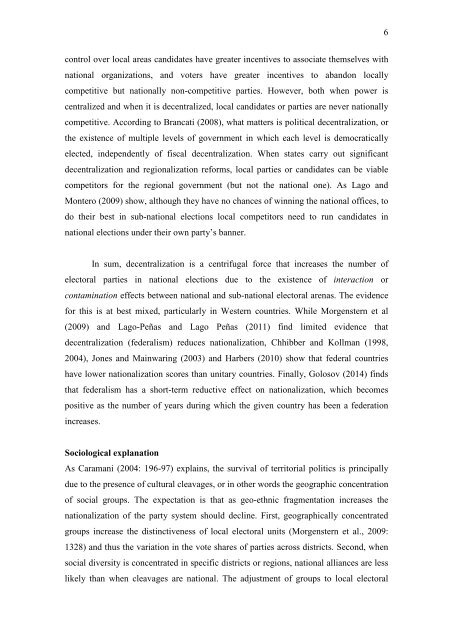AN ECONOMIC EXPLANATION OF THE NATIONALIZATION OF ELECTORAL POLITICS
n?u=RePEc:gov:wpaper:1602&r=fdg
n?u=RePEc:gov:wpaper:1602&r=fdg
Create successful ePaper yourself
Turn your PDF publications into a flip-book with our unique Google optimized e-Paper software.
6<br />
control over local areas candidates have greater incentives to associate themselves with<br />
national organizations, and voters have greater incentives to abandon locally<br />
competitive but nationally non-competitive parties. However, both when power is<br />
centralized and when it is decentralized, local candidates or parties are never nationally<br />
competitive. According to Brancati (2008), what matters is political decentralization, or<br />
the existence of multiple levels of government in which each level is democratically<br />
elected, independently of fiscal decentralization. When states carry out significant<br />
decentralization and regionalization reforms, local parties or candidates can be viable<br />
competitors for the regional government (but not the national one). As Lago and<br />
Montero (2009) show, although they have no chances of winning the national offices, to<br />
do their best in sub-national elections local competitors need to run candidates in<br />
national elections under their own party’s banner.<br />
In sum, decentralization is a centrifugal force that increases the number of<br />
electoral parties in national elections due to the existence of interaction or<br />
contamination effects between national and sub-national electoral arenas. The evidence<br />
for this is at best mixed, particularly in Western countries. While Morgenstern et al<br />
(2009) and Lago-Peñas and Lago Peñas (2011) find limited evidence that<br />
decentralization (federalism) reduces nationalization, Chhibber and Kollman (1998,<br />
2004), Jones and Mainwaring (2003) and Harbers (2010) show that federal countries<br />
have lower nationalization scores than unitary countries. Finally, Golosov (2014) finds<br />
that federalism has a short-term reductive effect on nationalization, which becomes<br />
positive as the number of years during which the given country has been a federation<br />
increases.<br />
Sociological explanation<br />
As Caramani (2004: 196-97) explains, the survival of territorial politics is principally<br />
due to the presence of cultural cleavages, or in other words the geographic concentration<br />
of social groups. The expectation is that as geo-ethnic fragmentation increases the<br />
nationalization of the party system should decline. First, geographically concentrated<br />
groups increase the distinctiveness of local electoral units (Morgenstern et al., 2009:<br />
1328) and thus the variation in the vote shares of parties across districts. Second, when<br />
social diversity is concentrated in specific districts or regions, national alliances are less<br />
likely than when cleavages are national. The adjustment of groups to local electoral


